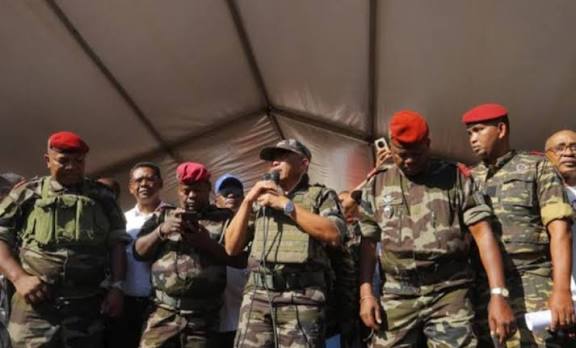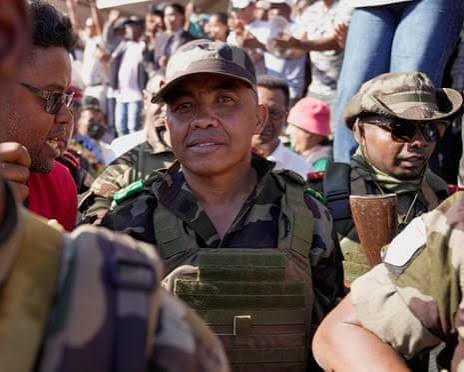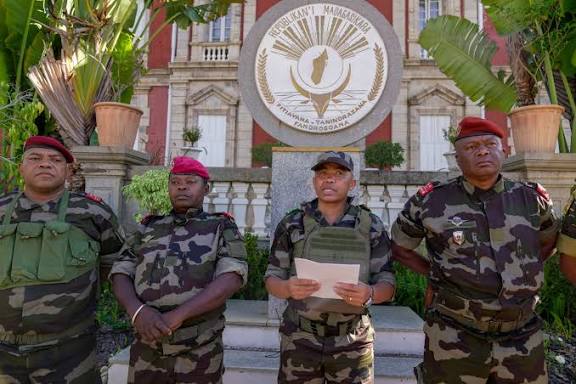In response to the military takeover that overthrew President Andry Rajoelina, the African Union (AU) has suspended Madagascar with immediate effect, following a political uproar that gripped the Indian Ocean.
The coup, following its sibling sisters among the African countries in recent years, unfolded barely a week after defected President Rajoelina appointed General Ruphin Fortunat Zafisambo as the new prime minister.
The suspension was enacted following an emergency session of the AU Peace and Security Council. Chairperson Mahmoud Youssouf condemned the seizure of power as an “unconstitutional change of government,” reaffirming the Union’s unwavering respect for constitutional order and peaceful resolution of conflicts.
“The rule of law must prevail over the rule of force. Our approach is grounded in law and dialogue,” Youssouf stated.
The political crisis escalated over the weekend when President Rajoelina reportedly fled the country after army units defected to join youth-led protests that had persisted for weeks. On Tuesday, Madagascar’s constitutional court declared the president’s seat vacant, while naming Michael Randrianirina, commander of the elite CAPSAT army unit, as the nation’s new leader.
Upon taking power, Randrianirina moved to dissolve key democratic institutions, including the senate, the constitutional court, and the electoral commission. The lower house of parliament was spared, having previously voted to impeach the president—a move Rajoelina has since declared “null and void.”

A clear power struggle is now emerging over the country’s political timeline. While the new military leader has announced intentions for a two-year transitional rule before organizing new elections, the constitutional court has directed him to hold polls within 60 days.
The immediate suspension underscores the AU’s firm stance against the seizure of power by force on the continent.
How CAPSAT Takeover
The Army Corps of Personnel and Administrative and Technical Services, abbreviated as CAPSAT, is an elite and politically powerful unit of the Madagascar Armed Forces, headed by Colonel Michael Randrianirina.
Following weeks of protest and political turmoil over prolonged water and power shortages, the military unit began to disobey orders from the Rajoelina government—joining the youth–led protest—before seizing the country’s capital Antananarivo on 12th October, 2025.
Meanwhile, the coup removed the head of the Madagascar’s Senate, with the civilian authorities accepting CAPSAT’s nominee Randrianinira to head the armed forces.
The Madagascar former president fled the country after the political unrest, sanctioning the dissolution of the country’s National Assembly, which was ignored by the legislative body, and instead voted to dismiss him on 14th October.
Later that day, Madagascar’s political history experienced a U–turn, as they military takeover the power, dissolving important democratic bodies; the senate, the electoral commission, and the constitutional court—sparing the lower House of Parliament alone, due to their earlier move to impeach the President.
Recent Century, and the Growing Trends of Coup in Africa
The recent surge of coup in African countries is alarming, drawing widespread condemnation, with regional security concerns. From Gabon to Niger Republic, and down to Burkina, military personnel have shifted their main responsibility of safeguarding the country into political affairs. Madagascar’s recent occurrence is a new incident, following similar trends in Mali, Guinea and Chad within the past year.

The political crisis has escalated most recently in Gabon, where soldiers annulled election results and placed President Ali Bongo under house detention. This pattern echoes the July coup in Niger, which ousted a democratically elected president and triggered threats of military intervention from the West African bloc, ECOWAS.
These events have prompted a forceful response from continental bodies. The African Union (AU) has consistently suspended member states following unconstitutional changes of government, emphasizing that the “rule of law must prevail over the rule of force.” ECOWAS has imposed severe sanctions on junta-led countries in an effort to restore constitutional order.
Despite military powers consistently citing corruption, economic mismanagement, and worsening security as justifications for overthrowing governments—promising transitional periods leading to new elections, their promises represent a paradox, with timelines being often extended, prolonging military rule.
The repeated suspensions and diplomatic pressure highlight a critical battle for governance norms in Africa, as continental leaders strive to reverse a dangerous backslide towards militarized power.

